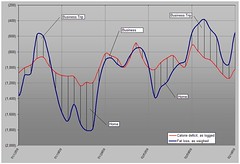As we all know, losing weight comes down to calories. Calories in
Vs. Calories out is really the most important factor to consider if you
are going to make any progress toward your weight loss goals, but how
many calories do I need to eat to lose weight?
Technically speaking there is no magic calorie number out there for every single person to follow and have great weight loss results. Some people get great results eating only 1500 calories a day, while others have great results eating 2200 a day.
Being able to assess your own caloric
needs is very beneficial for you, not only is it the fastest way to
achieve your results, but also to help preserve muscle and lean tissue.
When losing weight you need to understand that weight can be defined as
either fat, muscle or water. Your goal should be to lose FAT and try to
keep as much muscle as possible, losing too much muscle is going to give
off the dreaded skinny-fat look, which none of us want. The key to this
is determining how many calories to eat compared to your calorie
expenditure.
How to calculate caloric needs
First of all to calculate your daily requirements, you are going to need to do a little math using the Harry Benedict principle formula. Your first step will be to calculate you B.M.R, your basal metabolic rate (B.M.R) is the amount of energy your body needs to function.
B.M.R
The formula to calculate your basal metabolic rate is as follows;
Women:
655 + (4.3 x weight in pounds) + (4.7 x height in inches) - (4.7 x age in years)
Men:
66 + (6.3 x weight in pounds) + (12.9 x height in inches) - (6.8 x age in years)
The formula only applies to adults
Daily Activity
You then need to take your daily activity into consideration, as this is also going to be a factor in discovering your daily calorie needs.
To calculate your activity the formula is;
To lose weight you ideally want to be aiming about 100-200 calories less than your daily maintenance. Don't go overboard and drastically reduce your calories under your requirements, as this will result in both muscle and water loss. Your goal should be to lose fat fast, while maintaining muscle.
Technically speaking there is no magic calorie number out there for every single person to follow and have great weight loss results. Some people get great results eating only 1500 calories a day, while others have great results eating 2200 a day.
 |
| Calorie Deficit vs. Fat Loss (Photo credit: syvwlch) |
How to calculate caloric needs
First of all to calculate your daily requirements, you are going to need to do a little math using the Harry Benedict principle formula. Your first step will be to calculate you B.M.R, your basal metabolic rate (B.M.R) is the amount of energy your body needs to function.
B.M.R
The formula to calculate your basal metabolic rate is as follows;
Women:
655 + (4.3 x weight in pounds) + (4.7 x height in inches) - (4.7 x age in years)
Men:
66 + (6.3 x weight in pounds) + (12.9 x height in inches) - (6.8 x age in years)
The formula only applies to adults
Daily Activity
You then need to take your daily activity into consideration, as this is also going to be a factor in discovering your daily calorie needs.
To calculate your activity the formula is;
- If you are sedentary: B.M.R x 20 percent
- If you are lightly active: B.M.R x 30 percent
- If you are moderately active (You exercise most days a week.): B.M.R x 40 percent
- If you are very active (You exercise intensely on a daily basis or for prolonged periods.): B.M.R x 50 percent
- If you are extra active (You do hard labor or are in athletic training.): B.M.R x 60 percent
To lose weight you ideally want to be aiming about 100-200 calories less than your daily maintenance. Don't go overboard and drastically reduce your calories under your requirements, as this will result in both muscle and water loss. Your goal should be to lose fat fast, while maintaining muscle.
While being able to calculate your daily requirements is the
first step to results, it is not the only factor that goes into healthy
weight loss. Many other factors play a important role such as; food,
timing, sleep, rest, and many more. To achieve a greater understanding
of weight loss I would suggest trying a weight loss guide, or a weight
loss program. The truth about abs program is one of these great guides
that details all the information needed to successfully lose weight, and
provide you with the scientific knowledge to understand your body.
Check out my website where I have a detailed review of the program.
Article Source:
http://EzineArticles.com/?expert=Hayden_Brass
